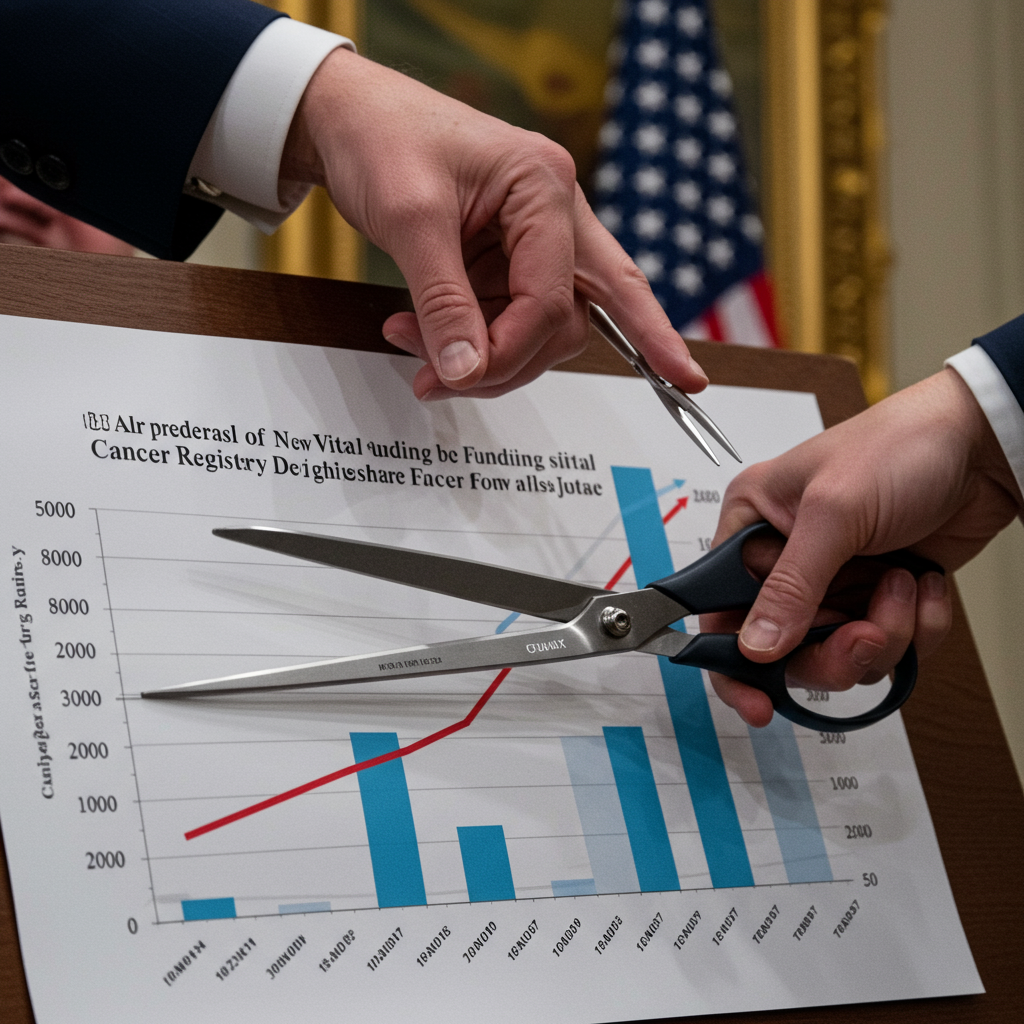New Hampshire’s ability to track and understand cancer, a leading cause of death, faces a significant challenge. A critical federal program that provides the bulk of funding for the state’s cancer registry is on the chopping block. Proposed cuts in President Trump’s discretionary funding recommendations for Fiscal Year 2026 could eliminate the crucial financial support that has sustained New Hampshire’s cancer surveillance efforts for four decades. Experts warn that losing this funding could mean the end of the registry itself, blinding the state to vital public health data. This potential loss comes despite the acknowledged importance of health surveillance and environmental health in federal proposals.
The Indispensable Role of New Hampshire’s Cancer Registry
For forty years, New Hampshire’s cancer registry has served as the central repository for documenting every new cancer diagnosis within the state. This comprehensive database is far more than just a list of cases. It is a fundamental tool for public health research, policy development, and clinical understanding.
The registry’s data has yielded critical insights impacting public health in New Hampshire. It was instrumental in identifying the unusually high rate of kidney cancer in Merrimack, a community grappling with PFAS chemical contamination in its water supply. Registry information also prompted state officials to investigate elevated childhood cancer rates, exploring potential environmental links as a cause. Clinicians at institutions like the Dartmouth Cancer Center rely on this data daily. Andrew Loehrer, an associate professor of surgery there, explains that the registry allows them to spot troubling trends, such as the rise in rectal cancer among young adults. It also provides the evidence base needed to assess the impact of health policy decisions, like determining if Medicaid expansion leads to earlier cancer diagnoses in rural areas, as the data has suggested. In 2022 alone, the registry documented over 9,000 new cancer diagnoses in the state. Losing this capacity, Loehrer starkly notes, would be like “fanning smoke out of a room without knowing where the fires are coming from.”
Funding Foundations Facing Elimination
State cancer registries like New Hampshire’s are primarily supported by two key federal programs: the National Institutes of Health’s (NIH) Surveillance, Epidemiology, and End Results (SEER) program and the Centers for Disease Control and Prevention’s (CDC) National Program of Cancer Registries (NPCR). It is the NPCR that is specifically targeted for elimination in the proposed FY 2026 budget recommendations. New Hampshire currently receives a significant $600,000 annually through a five-year NPCR grant awarded in 2022, comprising the majority of its funding.
The situation is being described in dire terms by those in the field. Lori Swain, executive director of the National Cancer Registrars Association, calls the current funding threat “like nothing we’ve ever seen before.” She views the potential cut as the elimination of the very “backbone of cancer surveillance in this country” and questions if recovery from such a blow would even be possible. This isn’t the first time funding for cancer registries has faced proposed cuts, but the scale and target this time are viewed with particular alarm. The National Institute of Health and the National Cancer Institute, which oversee the SEER program, may also face potential reductions.
The Stakes Are High: Impacts on Tracking and Environmental Health
Eliminating funding for the registry would have profound consequences for New Hampshire’s public health. The state would lose its fundamental ability to track essential cancer data: where people are diagnosed, the specific types of cancer they have, and how advanced their disease is when detected. Without this granular information, identifying local clusters of cancer, understanding variations in diagnosis stages, or evaluating the effectiveness of prevention and screening programs becomes nearly impossible. This directly undermines efforts to care for and reduce the impact of cancer, a leading cause of death nationwide.
Furthermore, the cancer registry plays a crucial role in understanding the link between environmental factors and public health in New Hampshire. Cancer incidence often serves as a critical indicator of environmental problems, as seen with the Merrimack PFAS link. New Hampshire faces various environmental challenges, including ongoing debates about landfill siting and potential contamination from sources like aging wastewater systems. While the state and federal partners are also engaged in cleanup efforts, such as recent EPA funding for brownfield remediation in Nashua and Concord, the cancer registry provides essential data to assess the health outcomes potentially tied to these environmental exposures. Losing the registry means losing a vital tool for documenting how industrial emissions, chemical pollutants, and other environmental factors might be affecting the health of Granite Staters. It would severely hamper the ability to investigate environmental health concerns and make informed policy decisions based on concrete data.
Budget Justifications and Broader Advocacy
The proposed budget recommendations from the Trump Administration justify cuts to the office housing the NPCR, along with other CDC programs like environmental health and global health initiatives, by stating a need to refocus the CDC’s efforts. The stated priority is shifting towards emerging and infectious disease surveillance, outbreak investigations, and preparedness. Programs marked for elimination are labeled in the budget document as “duplicative, DEI, or simply unnecessary.”
However, even within the Department of Health and Human Services’ own 2026 budget proposal, national and state health surveillance is recognized as “critical to proactively address public health challenges,” with a significant allocation proposed for surveillance activities. The proposal also explicitly prioritizes reducing exposure to environmental toxins linked to cancer. This creates a confusing contradiction, simultaneously acknowledging the importance of surveillance and environmental links while proposing cuts to programs that support both. Advocates find the proposed cuts particularly perplexing. Mike Rollo of New Hampshire’s American Cancer Society Cancer Action Network chapter notes that funding for cancer registries is a relatively small expense yielding a massive public health impact. He argues that this foundational data is essential for understanding cancer in the state, supporting advocacy efforts, and continuing the progress made in treating and managing various cancers. Removing this cornerstone of data collection risks undermining years of advancements and leaving the state without a clear picture of cancer’s impact on its residents.
Frequently Asked Questions
What is the New Hampshire cancer registry and why is it important?
The New Hampshire cancer registry is a statewide database that records information on every new case of cancer diagnosed in the state. It has operated for 40 years and serves as a vital repository for research and policy. Its importance lies in its ability to identify cancer trends, investigate potential environmental links (like the Merrimack PFAS situation), evaluate the impact of health policies (such as Medicaid expansion), and understand how cancer affects different populations within New Hampshire. It’s seen as essential for public health and clinical understanding of cancer.
Which federal programs fund state cancer registries like NH’s, and which is facing potential cuts?
State cancer registries, including New Hampshire’s, are primarily funded by two federal sources: the National Institutes of Health’s (NIH) Surveillance, Epidemiology, and End Results (SEER) program and the Centers for Disease Control and Prevention’s (CDC) National Program of Cancer Registries (NPCR). The program currently facing potential elimination in the proposed Fiscal Year 2026 federal budget recommendations is the CDC’s National Program of Cancer Registries (NPCR), which provides the bulk of New Hampshire’s registry funding.
What could happen to cancer surveillance in New Hampshire if federal funding is eliminated?
If federal funding for the New Hampshire cancer registry is eliminated as proposed, experts warn that the registry could cease to exist. This would cripple the state’s ability to systematically track crucial data points about cancer cases, such as the location of diagnoses, the specific types of cancer, and the stage at which cancer is detected. Losing this data would severely hinder public health officials, researchers, and clinicians from understanding cancer trends, identifying potential causes (including environmental ones), evaluating prevention and treatment efforts, and ultimately, caring for the population affected by cancer.
A Critical Juncture for Public Health Data
The potential elimination of federal funding for the New Hampshire cancer registry represents a critical juncture for public health surveillance in the state. The registry is not merely a collection of statistics; it is a foundational tool that informs research, guides policy, and helps protect communities by identifying potential environmental health hazards. The proposed cuts threaten to dismantle decades of essential data collection and analysis, leaving New Hampshire without the crucial insights needed to combat a disease that affects thousands of its residents each year. The implications extend beyond data points, impacting the state’s ability to understand and respond effectively to cancer and its complex links to the environment and public well-being.




